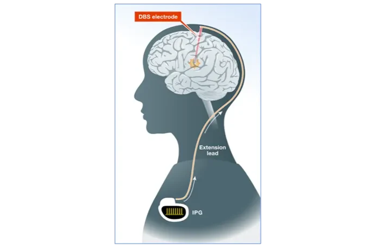Understanding The Role Of Ceramic Capacitors In Implantable Deep Brain Stimulators

A deep brain stimulator (DBS), also known as a neuro-stimulator, is a medical device that uses electrical stimulation to treat neurological disorders such as Parkinson's disease, essential tremor, dystonia, and obsessive-compulsive disorder (OCD). The DBS is typically implanted under the skin near the collarbone or in the abdomen, and connected to a thin wire, or lead, that runs under the skin to the targeted area of the brain as shown in Figure 1.
The Critical Role Capacitors Play in a DBS
Capacitors are essential components in making sure a DBS functions correctly and safely. There are many roles capacitors must serve within the different parts of a DBS including the following:
- Decoupling and Filtering – These capacitors help separate the power supply and other electronic components, preventing interference or crosstalk. Capacitors act as filters by absorbing noise and high-frequency signals, ensuring a clean and stable power supply for the DBS system. Switched capacitors are popular for filter designs because of their extremely accurate frequency response along with good linearity and dynamic range.
- Surge Protection – Capacitors can offer a degree of surge or transient protection in the DBS. They can absorb and dissipate energy spikes or voltage surges that may occur due to external factors such as electrostatic discharge or electromagnetic interference (EMI). This protects the sensitive electronics and prevents damage to or malfunctioning of the DBS.
Get unlimited access to:
Enter your credentials below to log in. Not yet a member of RF Globalnet? Subscribe today.
